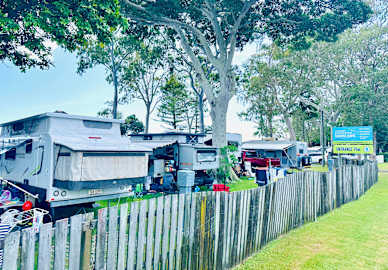The Fraser Coast Property Industry Association is understood to have initiated a quiet but deliberate campaign to push for the closure of the Torquay Beach Caravan Park well over a year ago, long before the matter appeared on the public’s radar.
The anger directed at the Council over the closure of the Torquay Caravan Park is unfair. From the outset, the direction and influence of the FCPIA figure has driven the narrative.
The audacity of FCPIA’s conduct has exposed a deep misalignment between the organisation and the community it purports to represent.
The policy appears more akin to a speculative misstep, comparable in judgment to inserting a fork into a toaster.
Despite strong concerns from internal and external stakeholders regarding the reputational risks for FCPIA, the decision proceeded, resulting in the current ugly, but avoidable, dispute.
The Easter holiday period has served as a public litmus test for the FCPIA.
From Point Vernon to Urangan, the Fraser Coast came alive with activity.
The Torquay Beach Caravan Park was filled to capacity, supporting surrounding businesses and reinforcing its role as a major economic driver.
Visitors reported spending $1,000 to $2,000 per stay.
With over ninety sites in the park, the cumulative benefit to the local economy reached into the hundreds of thousands—real, measurable income for a broad network of small enterprises.
Nevertheless, the FCPIA continues to stand by its position, unfazed by the broader implications.
According to President Glen Winney, the parkland ‘should be accessible to all residents and tourists, rather than being reserved for a select few who book into caravan parks, thereby monopolising the prime views and access.’
He further asserts that ‘no investor would consider building high-end accommodations or permanent apartments facing the unattractive backyards of caravanners’.
Given Mr. Winney’s dual role as FCPIA President and a major regional developer, his comments on potential development benefits, while not improper, may give rise to perceptions that are inconsistent with the neutrality expected of FCPIA.
The contradiction between the industry body’s claims and the facts on the ground over Easter are stark.
The existing foreshore, stretching across multiple suburbs, was underutilised during the school holidays.
Public space was readily available, and the claim that caravan park users are monopolising views or access is difficult to reconcile with observed reality.
Of immense concern is the impact this campaign is having on the local business community.
Many operators depend on the steady stream of visitors the caravan park brings.
Reports of financial distress, emotional strain, and potential job losses are real and current. It is troubling that these outcomes appear to have been either overlooked or dismissed by the FCPIA.
Before formal community consultation has even begun, over 5,600 hard copy signatures on a valid Council Standing Orders petition, 200 business endorsements on the same petition, and 2,200 online petition signatures have already been lodged in opposition to the FCPIA’s plan to shut down the Torquay Beach Caravan Park.
Ouch.
Mr. Winney alleges ‘While we understand that this is a divisive issue, a few vocal social media comments do not equate to a representative community view’.
The FCPIA’s policy engagement has expanded dramatically, with forty-two items listed for 24/25, covering areas like infrastructure, water security, youth services, and regional development, traditionally managed by local, state, and federal governments or actual qualified agencies.
Who exactly asked them to intervene?
Mr. Winney states that the decision to close the caravan park ‘was extensively debated and unanimously agreed upon by our executive committee, with no formal opposition from our members’.
However, in discussions I have held with members of the Executive, the Sub-Committee and broader members, materially different recollections of those events have been conveyed.
The FCPIA has largely conducted its campaign to close the Torquay Beach Caravan Park behind closed doors, avoiding public scrutiny through controlled internal processes.
While this may have preserved narrative control to date, that position is unlikely to hold.
With the full timeline of their agenda unfolds, alongside a projected cost to ratepayers exceeding $100,000 in a financially strained region, questions of accountability will intensify, potentially rendering certain positions untenable.





